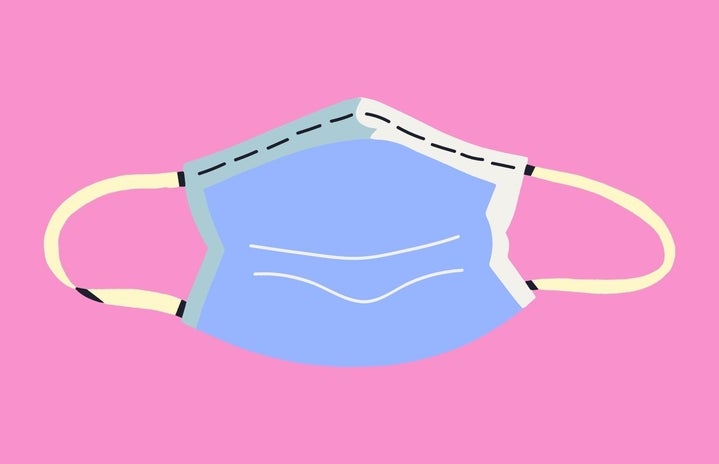The current coronavirus outbreak, also known as COVID-19, has taken the lives of hundreds of thousands around the world. The Centers for Disease Control and Prevention (CDC) explains how the virus is thought to be primarily spread when an infected person produces respiratory droplets when one coughs, sneezes, or talks. If a healthy person inhales the droplets, or they land on one’s mouth or nose, the disease can be transmitted.
just saw someone take their mask off, sneeze into their elbow, and then put their mask back on pic.twitter.com/FP3GkqWTNe
— St. Vincent “ACAB” Price (@muddaub) July 22, 2020
It’s no surprise that health experts have found an abundance of scientific evidence indicating that wearing face coverings greatly reduces the risk of spreading the coronavirus. If both a COVID-19 carrier and a healthy person are wearing masks, the probability of transmission is at its lowest. In fact, two masked hairstylists in Missouri who were infected with coronavirus made news after they continued appointments with 139 masked clients. Not one client ended up contracting the virus.
There’s countless scientific evidence pointing toward the benefits of face coverings. So why is there so much pushback?
What’s going on in the United States?
The responsibility to wear a mask should not be mistaken for or turned into a political issue. However, in the United States, this seems to be the case. Many people across the U.S. are refusing to wear masks, citing anything from masks causing low oxygen levels (which has been proven false!) to lack of interest. This behavior not only allows the virus to quickly spread and infect thousands, but it also places retail workers in a difficult position to enforce mask rules.
watching all these Karen’s have complete breakdowns when asked to wear a mask in public is so utterly disgusting. you can see the narcissism, the years of unchallenged privilege, the self-victimization, and the blind hate just spewing out. they’re rotten to the core.
— sarah schauer ? (@sarahschauer) June 28, 2020
Other countries are progressing much faster than the United States. For example, New Zealand’s early and aggressive response allowed the country to lift lockdown in early June. Unlike the United States, New Zealand citizens complied with social distancing measures and the country was able to successfully stop transmission of the virus.
Since phased openings are on a state-by-state basis, parts of the country have more stable numbers than others. Some states that have decided to reopen, such as Florida and Texas, are reporting coronavirus spikes and raising concerns about a second wave. Looking ahead, some health experts argue that the first wave of COVID-19 has not yet ended in the U.S., while at the same time others offer dire warnings for the upcoming winter season.
COVID-19 and systemic racism
It’s very important to acknowledge the influence systemic racism has on COVID-19 cases. Systemic racism defines how racism is present within every aspect of our society and negatively affects Black, Indigenous, Asian and Latinx people. Contributing factors to systemic racism include income inequality, housing, education, employment and much more.
Systemic racism greatly contributes to the disproportionate COVID-19 infection, hospitalization and death rates. For instance, Latinx, Black and Indigenous communities have significantly higher COVID-19 hospitalization rates compared to their white counterparts. In addition, employees of color are overrepresented in essential industries such as public transit, cleaning services and child care, increasing their risk of exposure.
Systemic racism impacts healthcare settings far beyond COVID-19. It’s important for all of us to consider the impact of this pandemic on marginalized communities, even if it’s not apparent in your immediate family or neighborhood.
Returning to campus
Heading back to campus this fall will be unlike any semester we’ve experienced. Some universities have decided to have classes entirely online, whereas many have proposed a hybrid model where students will have both online and in-person learning. Although universities are adopting strict social distancing measures, many students and campus employees are afraid of the potential risks in-person classes will bring without an available vaccine.
Related: I’m Certain About the Uncertainty of My Senior Year
Even though many of you have been away from your friends for several months, it’s still essential for us to maintain social distancing and mask wearing this fall. Unfortunately, you may see some of your peers partying like usual. This behavior is extremely dangerous to other students and to families who live in houses nearby campus, because it can promote transmission of the virus.
Following social distancing rules will definitely have its challenges in a college environment. However, it’s especially important to wear masks on campus because large groups are gathering in small areas, and wearing a mask will help reduce COVID-19 transmission. Normal activities while masked such as going to the dining hall and attending a lab may feel quite difficult at first. Nevertheless, it’s important to do your best and take the initiative to protect yourself and those around you.
Yall, we are still in a pandemic. Please quarantine. Folks are still getting infected. It’s still really not safe..
— ? (@IndyaMoore) July 1, 2020
We’re in a time where things are extremely uncertain. It’s important to understand the positive impacts wearing a mask can have within your community and to thank essential workers who continually put their health at risk.
Wearing a mask shouldn’t be a partisan issue. It’s a human rights issue that, if taken more seriously, can save thousands from coronavirus.
**Due to surgical mask shortages, it’s best to purchase cloth masks. If you’re unsure where to purchase a mask, there are Black-owned businesses where you can shop for masks while supporting communities that have been hit hardest by COVID-19. The CDC also published instructions on how to make sewn and non-sewn face coverings at home.

